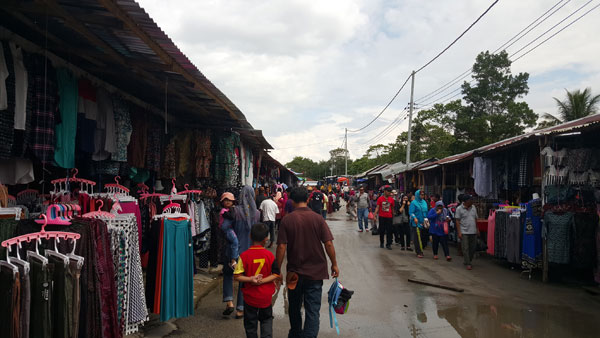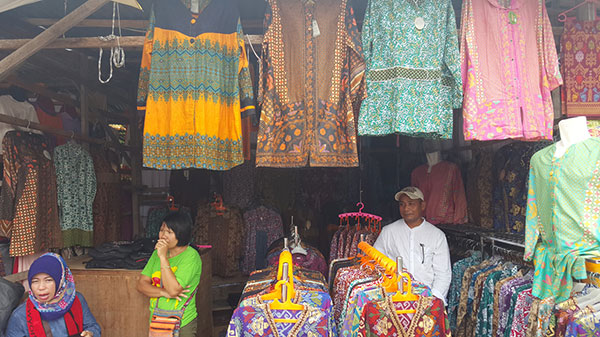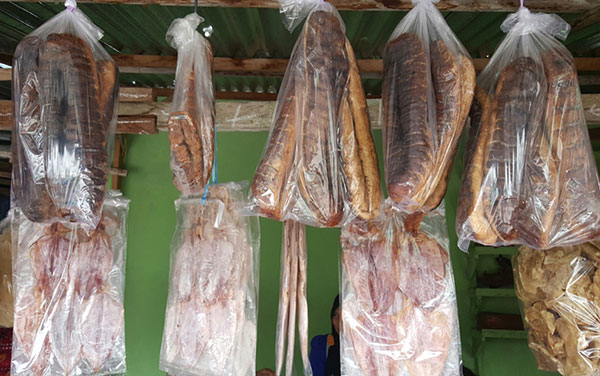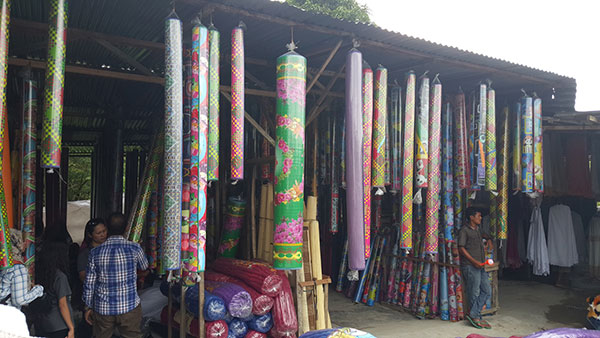
Shoppers walk along the tar-sealed street, flanked by a long line of stalls.
IT’S Sunday morning in Serikin and the market is bustling.
Set up in a tiny little village near the border of Sarawak with Indonesia, this weekend market on the far outskirt of Bau town is a very busy place.
Food producers and hawkers have been up since first light to resume trading activities which began on Saturday morning.
As the sun rises and warms the day, customers arrive, some with their shopping bags, keen to see what goods the market has to offer.
Recently, I went to the Serikin weekend market (with friends) for the second time after about 14 years. The environment is far different than many years ago although the activities remain the same.
There is now a huge parking space and the whole trading area has been tar-sealed. Trading is carried out along a stretch of stalls about one and a half mile long, and packed with goods on both sides.
It looks like the Serikin weekend market is still a major attraction in Bau District, drawing a multitude of locals and foreign visitors alike every weekend.
The large number of outside shoppers is evidenced by the fully occupied parking space just outside the shopping area and the rush of arriving vehicles, including tour buses and passenger vans.
Many pick-ups and private cars occupy the empty space along the side of road, leading to the market.
There are car parking touts, young and old, patrolling the vast ground and roadsides, directing traffic, and pointing to some vacant parking lots near residential properties. They collect a fee of RM4 for each vehicle.
Most drivers, including myself, are willing to pay this small sum for peace of mind. After all, this is close to no man’s land where the long arms of the law seldom reach.
The visitors include some locals who regularly shop at the market while most are weekenders who come to look for bargains.
Brisk business
The coffeeshops are doing brisk business as shoppers pop in to have a cuppa and order some exotic dish on the menu, including bakso (Indonesian meatballs).
A stall-holder at one of the mini coffeeshops seems to be doing well. He sells a bowl of bakso for RM5.
While having this Indonesian delicacy in one of the coffeeshops, I noticed that the seller, whom the shopowner calls Pak Rahman, had sold more than 10 bowls in about half an hour.
From the coffeeshop, we walked to the market packed with shoppers and visitors. While some just walked through the street to sample the offerings, many chatted with the hawkers, looking for bargains.
It was hot and sweaty strolling along the crowded market, especially under the noon sun.

Embroidered fabrics can be had for a bargain if you know where to look.
Kuching’s weekend culture
From humble beginnings, the Serikin weekend market has grown to become an integral part of Kuching’s weekend culture with over 200 stalls plying their wares.
The market which attracts vendors from the nearby villages as well as Kalimantan across the border, has been a popular feature in the area for about 24 years.
Located a few km from the Malaysian-Indonesian border, the market probably owes its success to the affordability of the vast array of goods on sale there — ranging from all kinds of souvenirs, fabrics, yard-goods and sarongs to lamps, floor mats, baskets, placemats, napkins and many more.
Sometimes known as a place where you can shop in Indonesia without leaving Malaysia, the market is said to have started in a very small way more than two decades ago.
According to the locals, the market began by offering a modest selection of sundries and veggies as well as wild game meat and live animals, and was frequented mainly by people from the vicinity.
However, news spread quickly, due mainly to the popularity of exotic animal meats, textiles and ready-made clothing which Indonesia is fairly famous for.
I made my first trip to the Serikin weekend market more than 10 years ago. At that time, there were no longer any sales of exotic game meat or live animals.
Back then, the place was quite chaotic with vehicles from Kuching parked all over the village lanes and roadsides, making it very hard to move around.
But the market has developed and grown, and the problem of indiscriminate parking has been solved.

Dried squid and sea cucumber are available at the market.
Private parking
Although a proper parking area has been designated, some of the villagers earn a decent sum by allowing visitors to park at the empty space around their house on market day.
The local coffeeshops are also doing roaring business — thanks to the droves of eager shoppers mainly from Bau, Serian and Kuching.
Even after my second visit, I am still wondering what could be the magnet that draws people to the Serikin market every weekend.
All I can say for now is that the market is buzzing with cheap goods, hawked by Indonesian vendors. The excitement may also be generated by the novelty of shopping at a border outpost with the distinct accent of Bahasa Indonesia.
There, frugal batik lovers will know a good bargain when they stop at any of the Indonesian textile stalls.A length of silk batik for making baju batik or kebaya is sold for RM30 to RM60 while colourful batik sarongs go for RM10 upwards, much cheaper than in town.
There are cheaper ready-to-wear clothes as well, made of cotton, batik and other materials. Rattan furniture and traditional Bidayuh mats made of split rattan and strips of tree bark are also among the attractions.
In the village, these mats are commonly used for drying agricultural produce but in town they are used as floor coverings which are almost indestructible. The large ones (2×2 metres), neatly finished with plaited borders, fetch between RM150 and RM200.
Something for everyone
Aside from clothing and rattan furniture, visitors can also shop for curtains, pillows, household wares, wooden cake moulds, cooking vessels, cups, saucers, old-fashioned hardwood mortars (with hefty pestles) and fancy glassware.
Shoppers with a sharp eye for details may also find exquisite handicrafts on display shelves.
Some of the handicrafts are regional traditional stuff, others are from further afield such as elegant carvings, reed-works and brass.
Then, there is the cluster of antiques and general-purpose instruments, including an ancient projector, a gramophone with a funnel and a circular-dial telephone, to name a few.
Generally, business looks quite good as out of 10 mostly Indonesian stalls, at least two are stocking things from back home.
Most of the vendors said it was worthwhile hawking in Serikin but were reluctant to reveal how much they made over one weekend.
However, a less shy embroidered fabric seller volunteered to divulge that he usually made hundreds of ringgit every weekend.
There are those who leave empty-handed, among them gem hawkers who sell mostly crafted ring stones.
According to a male seller, there were times he did not make anything even though, as he claimed, some of the ring stones he sold had healing powers.
There are a few wholesalers of goods such as ornamental wood carvings and goat skins.
Most buyers, of course, assume all the vendors are doing well, considering the whole place is transformed into a huge buzzing market with customers from Peninsular Malaysia, Singapore and Brunei, dropping by to shop.
For the womenfolk, there are many types and styles of ready-to-wear colourful Indonesian fabrics to choose from, not forgetting their favourite handbag brands going at half price.

Commercial floor mats sold at the Serikin weekend market.
